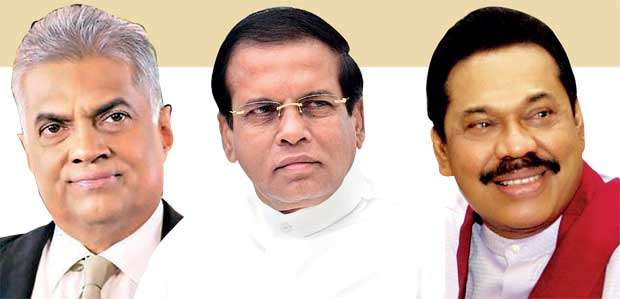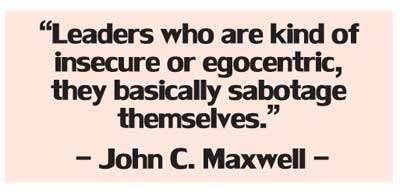25 Jan 2019 - {{hitsCtrl.values.hits}}

 Coalition governments are usually sabotaged, if at all, from outside its orbit. A strong united Opposition, as was evident against the Dudley Senanayake-led coalition just prior to the 1970 elections and then against Sirimavo Bandaranaike-led coalition regime a few months before 1977 polls, was a special ingredient necessary for such a sabotage scheme.
Coalition governments are usually sabotaged, if at all, from outside its orbit. A strong united Opposition, as was evident against the Dudley Senanayake-led coalition just prior to the 1970 elections and then against Sirimavo Bandaranaike-led coalition regime a few months before 1977 polls, was a special ingredient necessary for such a sabotage scheme. But neither the Dudley-led coalition nor the Sirimavo-led coalition was damaged or incapacitated from within. Of course, both these coalition governments were constituted under the pre-1978 constitutions; one under the Lord Soulbury-Constitution and the other under 1972 Colvin R de Silva-Constitution. Nor was the ‘Proportional Representation’ system under which Members of Parliament were elected in operation. Sabotaging a government from within is a wicked act. Stabbing from behind is not an act one would easily forget or forgive. Julius Caesar’s last words, before his ultimate submission to death when he beheld his close friend Brutus, had been immortalized into history: One does not want to hear the words ‘Et tu, Brute’ addressed to him from his close friends or associates. ‘Et tu, Brute’ signifies ultimate betrayal!
The United National Party (UNP) and its leader Ranil Wickremesinghe have found their phony ‘Brutus’. With all due respect to real historical Brutus, he stabbed Julius Caesar from the front. He did not pursue Caesar from behind and deal that deathly blow from the rear. As Mark Antony remarked in his glorious eulogy for Caesar, ‘Brutus was a noble man’. Such historical exaggerations were not wasted by Shakespeare’s pen. What is the historical significance of Caesar and Brutus in the current Sri Lankan context? The reader would ask that question and the answer is so near, yet too far for our modern day Brutus is still alive and may be planning yet another brutal massacre of our cherished institutions.
Ignorance of the validity and critical relevance of those institutions to the wellbeing of each man, woman and child in modern Sri Lanka is a terrible aspect of our politicians of today. Loyalty and obedience to those institutions that protect and safeguard the fundamental rights and privileges of all citizens is rarely upheld by today’s politicians. Today’s politicians are too preoccupied with their eagerness to find ways and means to gain access to the national coffers. Obedience to the institutions of democracy has become an anachronism. Service of the people is secondary; yet we have in our history. When exactly 56 years ago in 1962, J R Jayewardene, the then Deputy of Dudley Senanayake, the Leader of the Opposition was made aware of a looming Coup d’état against the Sirimavo Bandaranaike  government, he called Sydney de Zoysa, one of co-conspirators of the attempted military coup of 1962 and told him off thus: ‘Sydney, I hear some of your people are planning ‘[a coup]. Don’t play with fire. Don’t tamper with democracy. You will start what has happened in so many countries in Latin America. Don’t do it.’ (Source: Page 118, J R Jayewardene of Sri Lanka, Professor K M de Silva and Howard Wriggins). One couldn’t have found a more vocal and aggressive critic of the Sirimavo/Felix Dias than J R Jayewardene at the time. Yet his commitment to democracy (despite his efforts, later when he became first elected President of Sri Lanka, to bend that democracy without breaking it) and to the institutions that sustain it was apparently more than his zeal to grab power in whatever available means. Sustenance of institutions that defend and advance the cause of democracy is not an easy task for politicians whose commitment to politics is devoid of an authentic allegiance to ideological reasoning. Democracy and demands for its continuity in the midst of complex objective conditions and societal contradictions are subjects that are debated and discussed by University academics and media top-notch editors and deputy editors. Profit-motivated private sector executives might pretend that they too have an opinion which, more often than not, is inconsistent with those of the academics, yet a philosophical commitment on the part of each segment in society is indispensable for a thriving and growing system of governance that is truly committed to the service of the masses.
government, he called Sydney de Zoysa, one of co-conspirators of the attempted military coup of 1962 and told him off thus: ‘Sydney, I hear some of your people are planning ‘[a coup]. Don’t play with fire. Don’t tamper with democracy. You will start what has happened in so many countries in Latin America. Don’t do it.’ (Source: Page 118, J R Jayewardene of Sri Lanka, Professor K M de Silva and Howard Wriggins). One couldn’t have found a more vocal and aggressive critic of the Sirimavo/Felix Dias than J R Jayewardene at the time. Yet his commitment to democracy (despite his efforts, later when he became first elected President of Sri Lanka, to bend that democracy without breaking it) and to the institutions that sustain it was apparently more than his zeal to grab power in whatever available means. Sustenance of institutions that defend and advance the cause of democracy is not an easy task for politicians whose commitment to politics is devoid of an authentic allegiance to ideological reasoning. Democracy and demands for its continuity in the midst of complex objective conditions and societal contradictions are subjects that are debated and discussed by University academics and media top-notch editors and deputy editors. Profit-motivated private sector executives might pretend that they too have an opinion which, more often than not, is inconsistent with those of the academics, yet a philosophical commitment on the part of each segment in society is indispensable for a thriving and growing system of governance that is truly committed to the service of the masses.
When one forgets this basic notion of commitment to the service of the masses, other incendiary ambitions take control of the conduct and mindset of the politician. The culture that has been growing ever since the unleashing of the free market-oriented open economy in 1977, not only did it adversely contribute towards the waning in our elementary human values, it has caused a tremendous gulf between the powerful and powerless. Such social contradictions have generated their own momentums which cannot be checked and balanced in the context of historical advance of society.
Caught in the vortex of these confused and confusing events, when rulers take arbitrary decisions in order to strengthen and advance their own careers, what is most damaged are the institutions that they preside over. However, against a backdrop of powers that are judiciously divided amongst the Executive, the Legislature and the Judiciary, when the Chief Executive, Prime Minister or any other ambitious ignoramus tries to kill any democratic institutions or their ancillary bodies, without seemingly being aware of such destructive behaviour which is chiefly due to lack of education, the natural collapse of those sacred institution cannot be checked, nor averted.
Internal combustion that is taking place within the UNP-led government of today is mainly owing to these political and social impulses displayed by some vested interests within the same coalition. The coalition government that was elected in August 2015 has transformed itself into collusion-with-Opposition. The fundamental miscalculations made by the trio of Maithripala Sirisena, Mahinda Rajapaksa and Ranil Wickremasinghe have produced their drastically destructive consequences. A brittle coalition government, insecure political environment and an irreversible political dynamic, creating in the minds of the people at large a strong sense of anarchy, are these consequences.
The basic differences of political thinking and calculus between the two leading parties in the country, namely United National Party (UNP) and Sri Lanka Freedom Party (SLFP) have eventually defined this moving political dynamism. The plight of the public is totally ignored and disregarded as inconsequential. That truly is a tragedy.
To be continued…
30 Nov 2024 26 minute ago
30 Nov 2024 3 hours ago
30 Nov 2024 5 hours ago
30 Nov 2024 6 hours ago
29 Nov 2024 29 Nov 2024